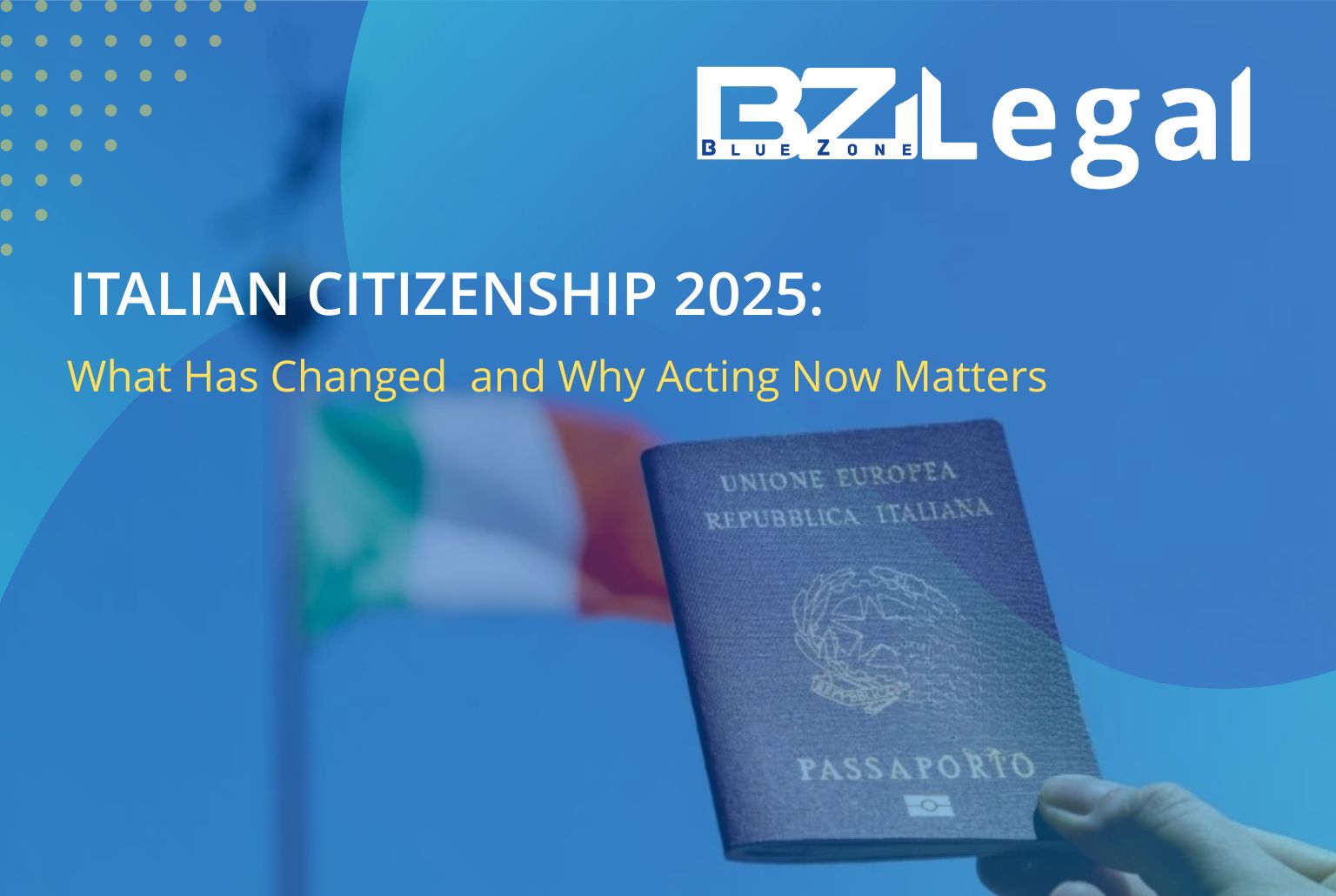Italian Citizenship by Descent 2025 | Tajani Law & Court Decisions Explained
By Pier Paolo Sinigaglia G. & Cristina Guerrini
-
A Year of Major Reform in Italian Citizenship Law
In 2025, Italy introduced sweeping reforms that redefine the framework for acquiring and maintaining Italian citizenship by descent (iure sanguinis).
The “Tajani Decree” – Decree-Law No. 36 of March 28 2025, converted into Law No. 74 of 2025 – imposes unprecedented restrictions, while a series of new judicial decisions reshape the legal landscape for millions of Italian descendants worldwide.
-
The “Tajani Law”: A Generational Limit and Retroactive Effects
The new legislation sets a two-generation limit: citizenship can only be recognized up to the grandchildren of an Italian citizen. Descendants of great-grandparents or earlier ancestors are excluded, even if they meet all previous legal criteria.
Even more critically, the law seeks to apply retroactively, declaring that anyone who did not submit an application before March 27 2025 “never had” the right to Italian citizenship. This contradicts more than a century of jurisprudence establishing that citizenship by descent is a birthright acquired at birth, not a privilege granted by the State.
The reform’s clear objective is to drastically reduce the number of new Italian citizens abroad—particularly in the Americas—by restricting the transmission of citizenship through successive generations.
-
Judicial Developments: The Courts Push Back
Amid political change, Italy’s judiciary has taken decisive steps to reaffirm fundamental legal principles.
Constitutional Court Judgment No. 142/2025
On July 31 2025, the Constitutional Court issued a landmark decision confirming that Italian citizenship is transmitted indefinitely through blood, without requiring residence, language, or cultural ties with Italy.
The Court upheld Article 1 of Law No. 91/1992, which recognizes as Italian any child born to an Italian mother or father. It ruled that lineage alone remains a sufficient and constitutionally valid basis for citizenship recognition—therefore rejecting attempts to impose generational limits or subjective notions of “effective connection.”
This judgment strengthens the protection of iure sanguinis applicants, ensuring continuity for families with deep historical roots abroad.
Supreme Court’s Upcoming Decision on Citizenship of Minors
In the wake of that ruling, the United Sections of the Italian Supreme Court (Corte di Cassazione) are preparing to address a related issue: whether a minor automatically loses Italian citizenship if a parent naturalized in another country while the child was still underage.
Conflicting decisions in 2023 and 2024 interpreted the old Law No. 555 of 1912 in different ways. The Supreme Court’s forthcoming judgment will determine whether such loss must be explicitly renounced upon reaching adulthood—or if it occurs automatically as a result of the parent’s naturalization.
This decision will be pivotal in clarifying how Italian citizenship is transmitted across generations and may require the Ministry of the Interior to revise its restrictive 2024 guidelines.
-
Faster Proceedings for Citizenship Lawsuits
At the same time, Decree-Law No. 117/2025 introduces urgent procedural reforms to accelerate civil cases as part of Italy’s National Recovery and Resilience Plan (PNRR).
Courts can now schedule hearings more swiftly and even conduct them online, significantly reducing the waiting time for judicial recognition of citizenship. Tribunals such as Brescia and Salerno are already implementing these measures, serving as models for nationwide adoption.
-
A Constitutional Challenge from Turin
In September 2025, the Court of Turin accepted a petition to raise a constitutional question regarding the validity of the “Tajani Law” itself.
This represents an essential first step in defending the rights of Italo-descendants and underscores the importance of continued strategic litigation to preserve the iure sanguinis principle and prevent irreversible loss of nationality rights.
-
Why Acting Now Is Crucial
While the courts continue to examine these issues, one fact is clear: delaying action may mean losing your right.
Italian jurisprudence recognizes citizenship by descent as permanent and imprescriptible, but only those who file a judicial claim in Italy can ensure recognition under the previous, more favorable framework.
At Blue Zone Legal, together with our Colleague Pier Paolo Sinigaglia, Partner at Atlaslex Law Firm, an experienced attorney specializing in Italian nationality law, we assist families of Italian origin around the world in evaluating eligibility, preparing documentation, and pursuing their citizenship claims before Italian courts.
Our shared mission is to uphold the idea that citizenship is not a concession—it is a legacy linking generations of Italians across continents.
-
Key Takeaways
- Citizenship by descent remains a constitutional right transmitted by blood.
- The “Tajani Law” imposes severe generational limits and retroactive provisions.
- Recent court decisions reaffirm the continuity of Italian identity beyond borders.
- Judicial proceedings in Italy are becoming faster thanks to the 2025 reforms.
- Act promptly to preserve your right before new restrictions take full effect.
-
Contact Us
For personalized advice on how these changes may affect your case:
🌐 www.bluezonelegal.com
📧 info@bluezonelegal.com
© 2025 Blue Zone Legal®. All rights reserved.
The information contained in this blog is provided for informational purposes only and does not constitute legal advice, nor does it create an attorney-client relationship. Readers should not act upon this information without seeking appropriate professional counsel.
Quotations of this content may be used provided that proper credit is given to Blue Zone Legal and a direct link to the original publication is included.







Leave A Comment